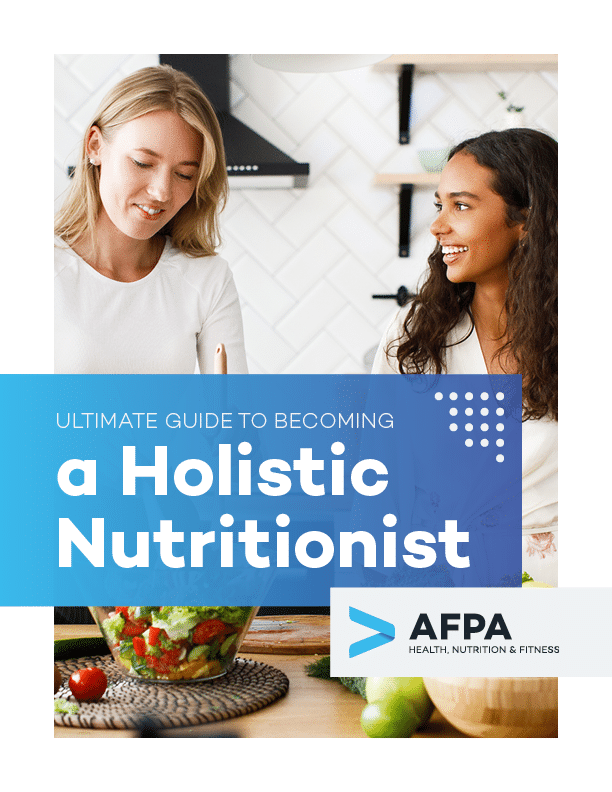Most people know food is important — but they may not know how to eat in a way that supports their health and wellness. Enter in, nutritionists. Nutrition specialists play a hugely important role in helping people feel better. If you’re interested in fulfilling this role, then you might be considering how to become a nutritionist.
The challenge is that practicing as a nutritionist looks different in every state due to discrepancies in state legislation. You may be wondering: Do I need to go through a degree program or a dietetics program accredited by the Accreditation Council for Education in Nutrition and Dietetics? Or can I go through an online nutrition certification program and provide general nutrition recommendations for clients as a nutrition coach or holistic nutritionist?
In this article, we’ll focus on becoming a Certified Nutritionist or Nutrition Coach, which is a type of certified, non-licensed nutrition professional, in Florida. This profession can make a huge impact on people’s lives while also offering great potential for professional growth.
One key point to note is that, when you work within your scope of practice, these roles don’t require a license, which makes the barrier to entry into these professional roles much lower than for licensed professions. In Florida, Certified Nutritionists and Health Coaches work under specific exemptions outlined in the Dietetics Practice and Nutrition Act. This allows for a range of practices in nutritional coaching, counseling, and support while still maintaining service standards.
This guide will walk you through everything you need to know about this career path – from understanding the laws and educational requirements to taking practical steps towards certification and building your career. We’ll also look at our Certified Holistic Nutritionist program, designed to prepare aspiring professionals to transform lives with integrative nutrition expertise.

Get Your Free Guide to Becoming a Holistic Nutritionist
Learn about the important role of holistic nutritionists, what it takes to be successful as one, and how to build a lucrative, impactful career in nutrition.
Different Ways to Practice Nutrition in Florida
There are many ways to work in nutrition in Florida, including as a Registered Dietitian Nutritionist (RDN), Certified Nutritionist, or Nutrition Coach.
Registered Dietitian Nutritionists (RDNs)
- RDNs are healthcare professionals who are accredited by the Academy of Nutrition and Dietetics.
- They must complete a rigorous course of study, such as an ACEND-Accredited Didactic Program in Dietetics (DPD), an accredited dietetic internship, and pass a national exam mandated by the Commission on Dietetic Registration (CDR) to earn the RD credential.
- RDNs often work in clinical nutrition, public health and community nutrition, food management, or private practice.
- They are the only professionals that can apply Medical Nutritional Therapy based on a diagnosis.
Certified Nutritionists
- These professionals typically hold a certification in nutrition from a reputable organization, such as AFPA.
- They may not be required to undergo training as extensive as RDNs and do not need a bachelor’s degree or master’s degree, but still possess credible knowledge.
- They may also have coaching training. (AFPA’s Certified Holistic Nutritionist program provides nutrition coaching training!)
- Certified Nutritionists can advise on general wellness and nutrition, and may work in conjunction with RDNs or physicians, but usually do not work in medical environments.
Nutrition Coaches
- This role often focuses on helping clients develop healthy eating habits through behavioral frameworks.
- A nutrition coach may work alongside other wellness professionals to provide holistic care.
- Health Coaching Certifications like those offered by AFPA, with a Nutrition Certification or Specialization can help establish credibility and expertise.
The distinction between these roles is significant, considering their educational pathways, scope of practice, and regulatory guidelines. Aspiring nutrition professionals in Florida must align their career goals with the appropriate educational track to make sure they meet state standards for practice.
Understanding Florida’s Dietetics Practice and Nutrition Act Exemptions
The Florida Dietetics Practice and Nutrition Act is a critical piece of legislation that sets the guidelines for practicing nutrition in the state. However, there are exemptions within this act that allow non-licensed professionals to provide nutrition advice, an important point for those looking to become certified nutritionists.
Florida’s Dietetics Practice and Nutrition Act: Exemptions
Exemptions under this act are designed to promote holistic health and wellness professions. This allows non-licensed nutrition professionals to offer dietary guidance without needing licensure, if certain criteria are met.
These specific exemptions include:
- Practicing holistic nutrition or other non-traditional nutrition practices that do not involve diagnosing or treating diseases.
- Providing general recommendations about diet and supplement use for healthy people.
- Offering wellness coaching or personal training services with a focus on nutrition.
The key is ensuring that the guidance provided does not replace medical advice or treatment from licensed healthcare providers.
Key Stakeholders in Shaping the Legislation
This legislation was not formed in a vacuum. Various stakeholders, including member schools and representatives from different areas of the health and wellness industry, played significant roles in shaping the Act. Their collective goal was to create an inclusive regulatory environment that respects diverse approaches to health while safeguarding public safety.
Stakeholder input is invaluable in creating laws like these, as it ensures the legislation is grounded in the practical realities of the field. Also, it fosters an environment where alternative approaches to health can flourish alongside traditional dietetics practice.
For those aspiring towards a career as a certified nutritionist, these exemptions offer a pathway to practice without requiring licensure. It also serves as a testament to Florida’s supportive regulatory environment; one which values diversity in health and wellness professions.
Education Requirements and Training for Certified Nutritionists in Florida
As an aspiring nutritionist in Florida, it’s important to know the education requirements. Education is crucial for a career in nutrition as it provides the necessary knowledge and skills for effective nutrition counseling.
Educational Criteria
To become a non-licensed nutrition professional in the state of Florida, you’ll need to:
- Obtain a High School Diploma or GED as the minimum educational requirement.
- Pursue specialized nutrition-focused educational programs to deepen your understanding of the subject.
AFPA’s Certified Holistic Nutritionist Program
AFPA’s Certified Holistic Nutritionist program offers comprehensive instruction on holistic nutrition principles – an approach that considers the whole person when creating nutritional strategies, including physical and emotional well-being.
Why choose AFPA’s holistic nutrition program? Here are three compelling reasons:
- Comprehensive Curriculum: The program covers a wide range of food science topics such as macronutrients, micronutrients, dietary theories, and lifestyle factors that affect health.
- Practical Application: Coursework focuses on applying learned theories to real-life situations via coaching methodologies, ensuring you can translate knowledge into practice.
- Holistic Approach: The curriculum emphasizes the importance of factors beyond just diet, such as stress management, physical activity, and emotional wellness.
Benefits of AFPA’s Certification Program
This specialized training program serves as a pathway to becoming a non-licensed nutrition professional in Florida under the exemption to licensure clause[^2^]. Besides learning about diet and nutrition, it also prepares you for your role in helping clients make positive lifestyle changes for better health outcomes.
Completing this certification program offers several advantages:
- Increased Credibility: It enhances your reputation within the industry, signaling to employers and clients that you have undergone rigorous training and possess expertise in holistic nutrition.
- Expanded Career Opportunities: With specialized knowledge, you will be better positioned for job roles in wellness centers, fitness facilities, private practice, or as a consultant.
- Greater Impact: Equipped with comprehensive understanding and practical skills, you can make a meaningful difference in people’s lives by guiding them towards healthier choices.
- Accessibility: AFPA certification is affordable and can be completed from home. If you can’t afford a bachelor of science or master of science or to invest the time to become a licensed dietitian, you can still gain a great education and make an impact.
In conclusion, the journey to becoming a non-licensed nutrition professional in Florida starts with a strong educational foundation and can be further strengthened through specialized training programs like AFPA’s Certified Holistic Nutritionist program. This combination ensures aspiring nutritionists are well-prepared to support clients on the journey to improved health and well-being.
Steps to Become a Nutritionist in Florida
Embarking on a career as a certified nutritionist in Florida involves several key steps, each of which builds the foundation for a successful practice in the field of nutrition and wellness.
Step 1: Obtain a High School Diploma or GED
The first step in pursuing a career as a nutritionist is to secure a High School Diploma or GED. This educational requirement is the gateway to specialized training programs and higher education opportunities.
Step 2: Enroll in a Nutrition Certification Educational Program
Prospective nutritionists must then enroll in an accredited nutrition certification educational program. For instance, AFPA’s Certified Holistic Nutritionist program provides comprehensive training in holistic nutrition strategies and wellness approaches, equipping students with the knowledge to advise clients on nutritional health.
Step 3: Get Certified
Upon completion of an educational program, aspiring nutritionists must pass a certification exam to demonstrate their proficiency and understanding of nutritional science. Certification is crucial as it validates the individual’s expertise and is often required by employers. To get an idea about the earning potential, you can explore certified nutrition consultant salary estimates online.
For a little more insight, the Bureau of Labor Statistics lists the annual mean wage for nutritionists and dietitians in the Miami-Fort Lauderdale-West Palm Beach, FL area as $ 70,940 as of May 2023.
Step 4: Gain Relevant Work Experience
Getting practical professional experience through internships or employment within the field is essential. This hands-on experience allows individuals to apply theoretical knowledge, hone skills, and build professional relationships.
Step 5: Begin Working as a Certified Nutritionist
Once you have a certification and experience, you can start a career as a certified nutritionist! The rewards for those who dedicate themselves to this profession are not only measured through potential earnings, but also through the positive impact they make on individuals’ lives through nutritional guidance.
Building a Career as a Non-Licensed Nutrition Professional in Florida
Starting a career as a non-licensed nutrition professional in Florida requires understanding the scope of practice, the need for specialized knowledge, and the laws governing this practice.
Scope of Practice for Non-Licensed Nutrition Professionals
To begin, it is essential to understand what tasks you can perform as a non-licensed nutritionist. The Florida statutes allow these professionals to provide general nutrition advice. This could involve educating clients about healthy eating habits, creating meal plans, or guiding them towards achieving their health and wellness goals.
Further Specialize Your Nutrition Knowledge
Next, consider expanding your skills and knowledge beyond the basics. It’s not just about understanding the nutritional values of different foods but also how to apply this information to meet individual needs. For instance, AFPA offers specializations in areas like weight loss or sports nutrition that can help you cater to specific client demographics.
Florida Exemption Law
Understanding Florida’s Dietetics Practice Act and its exemptions is also crucial. By law, non-licensed practitioners are exempt from licensure requirements under certain conditions. This includes providing services that do not involve medical nutrition therapy or being employed by a licensed healthcare facility.
Career Opportunities for Non-Licensed Nutrition Professionals
Career prospects are plentiful with roles available in many settings such as fitness centers, community health programs, corporate wellness companies, and more. A growing trend is the rise of online services offering virtual consultations. As a non-licensed practitioner, you have the flexibility to start your own online holistic health coach business or work as an online personal trainer.
Here are a few additional ideas to inspire your career launch:
Youth Wellness Instructor in Tallahassee – Mentor youth through wellness activities centered on healthy lifestyle habits including nutrition education, healthy cooking, and sports activities.
Work for or Start Your Own Healthy Meal Prep Company in Miami – Offer meal preparation and delivery services to fit clients’ meal plans and help them reach their health goals.
Host Corporate Nutrition Presentations in Jacksonville – Offer lunch and learn presentations for local businesses on nutrition for the workday or the relationship between eating and stress.
To better prepare yourself for these opportunities, consider exploring AFPA’s resources on developing a successful online holistic health coach business or how to become an online personal trainer. These guides provide valuable insights and strategies to establish yourself in the industry.
With the right education and a solid understanding of the Florida statutes and exemption laws, you can start building your career as a nutritionist in Florida. Not only does this profession provide a chance to improve others’ health, but it also offers a rewarding and flexible career path.
Main Takeaways
Florida’s regulatory environment is conducive for aspiring non-licensed nutrition professionals, such as certified nutritionists and nutrition coaches, offering ample room to grow and practice. The National Association of Nutrition Professionals affirms the value of this profession in promoting health and wellness.
Notably, AFPA’s Certified Holistic Nutritionist program stands as an excellent educational program. This program provides:
- Comprehensive knowledge about nutrition.
- Training on how to apply this knowledge effectively.
- Guided practical experience.
Armed with the knowledge and skills from AFPA’s programs, individuals are well-equipped to navigate the field of nutrition in Florida.
A career in nutrition is a commitment to improving people’s lives by enhancing their understanding of diet and health. It’s an opportunity to make a real difference, while also building a successful career.
For those considering this path, it is important to remember:
- Meet the education requirements: Obtain a high school diploma or GED.
- Enroll in an accredited nutrition certification program like AFPA’s.
- Get certified and gain relevant work experience.
- Start practicing as a Certified Nutritionist.
The process to becoming a certified nutritionist in Florida is challenging but rewarding. With the right education and dedication, anyone can transform their passion for nutritional wellness into a thriving career.
-
Holistic Nutritionist Certification
Original price was: $1099.00.$150.00/monthCurrent price is: $150.00/month. -
Gut Health Nutrition Specialist
Original price was: $799.00.$83.00/monthCurrent price is: $83.00/month. -
Master Level Nutrition Consultant Certification
Original price was: $2399.00.$158.00/monthCurrent price is: $158.00/month. -
Plant-Based Nutrition Specialist Certification
Original price was: $899.00.$125.00/monthCurrent price is: $125.00/month. -
Autoimmune Holistic Nutrition Specialist Certification
Original price was: $998.00.$133.00/monthCurrent price is: $133.00/month. -
Sports Nutrition Certification
Original price was: $699.00.$100.00/monthCurrent price is: $100.00/month.









